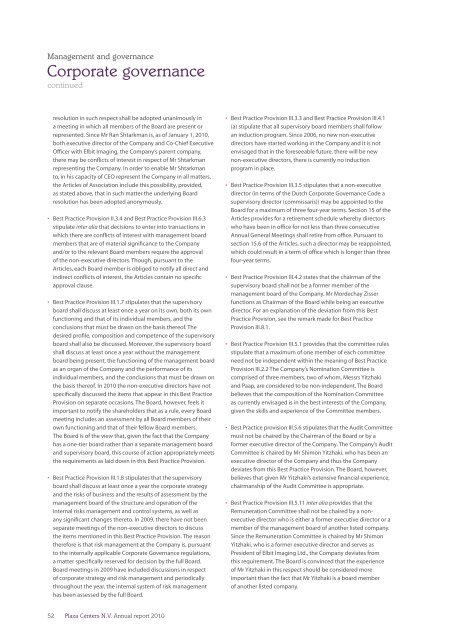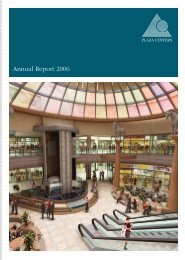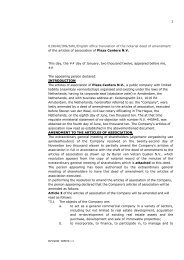Annual report 2010 - plazacenters
Annual report 2010 - plazacenters
Annual report 2010 - plazacenters
You also want an ePaper? Increase the reach of your titles
YUMPU automatically turns print PDFs into web optimized ePapers that Google loves.
Management and governance<br />
Corporate governance<br />
continued<br />
resolution in such respect shall be adopted unanimously in<br />
a meeting in which all members of the Board are present or<br />
represented. Since Mr Ran Shtarkman is, as of January 1, <strong>2010</strong>,<br />
both executive director of the Company and Co-Chief Executive<br />
Officer with Elbit Imaging, the Company’s parent company,<br />
there may be conflicts of interest in respect of Mr Shtarkman<br />
representing the Company. In order to enable Mr Shtarkman<br />
to, in his capacity of CEO represent the Company in all matters,<br />
the Articles of Association include this possibility, provided,<br />
as stated above, that in such matter the underlying Board<br />
resolution has been adopted anonymously.<br />
• Best Practice Provision II.3.4 and Best Practice Provision III.6.3<br />
stipulate inter alia that decisions to enter into transactions in<br />
which there are conflicts of interest with management board<br />
members that are of material significance to the Company<br />
and/or to the relevant Board members require the approval<br />
of the non-executive directors. Though, pursuant to the<br />
Articles, each Board member is obliged to notify all direct and<br />
indirect conflicts of interest, the Articles contain no specific<br />
approval clause.<br />
• Best Practice Provision III.1.7 stipulates that the supervisory<br />
board shall discuss at least once a year on its own, both its own<br />
functioning and that of its individual members, and the<br />
conclusions that must be drawn on the basis thereof. The<br />
desired profile, composition and competence of the supervisory<br />
board shall also be discussed. Moreover, the supervisory board<br />
shall discuss at least once a year without the management<br />
board being present, the functioning of the management board<br />
as an organ of the Company and the performance of its<br />
individual members, and the conclusions that must be drawn on<br />
the basis thereof. In <strong>2010</strong> the non-executive directors have not<br />
specifically discussed the items that appear in this Best Practice<br />
Provision on separate occasions. The Board, however, feels it<br />
important to notify the shareholders that as a rule, every Board<br />
meeting includes an assessment by all Board members of their<br />
own functioning and that of their fellow Board members.<br />
The Board is of the view that, given the fact that the Company<br />
has a one-tier board rather than a separate management board<br />
and supervisory board, this course of action appropriately meets<br />
the requirements as laid down in this Best Practice Provision.<br />
• Best Practice Provision III.1.8 stipulates that the supervisory<br />
board shall discuss at least once a year the corporate strategy<br />
and the risks of business and the results of assessment by the<br />
management board of the structure and operation of the<br />
internal risks management and control systems, as well as<br />
any significant changes thereto. In 2009, there have not been<br />
separate meetings of the non-executive directors to discuss<br />
the items mentioned in this Best Practice Provision. The reason<br />
therefore is that risk management at the Company is, pursuant<br />
to the internally applicable Corporate Governance regulations,<br />
a matter specifically reserved for decision by the full Board.<br />
Board meetings in 2009 have included discussions in respect<br />
of corporate strategy and risk management and periodically<br />
throughout the year, the internal system of risk management<br />
has been assessed by the full Board.<br />
• Best Practice Provision III.3.3 and Best Practice Provision III.4.1<br />
(a) stipulate that all supervisory board members shall follow<br />
an induction program. Since 2006, no new non-executive<br />
directors have started working in the Company and it is not<br />
envisaged that in the foreseeable future, there will be new<br />
non-executive directors, there is currently no induction<br />
program in place.<br />
• Best Practice Provision III.3.5 stipulates that a non-executive<br />
director (in terms of the Dutch Corporate Governance Code a<br />
supervisory director (commissaris)) may be appointed to the<br />
Board for a maximum of three four-year terms. Section 15 of the<br />
Articles provides for a retirement schedule whereby directors<br />
who have been in office for not less than three consecutive<br />
<strong>Annual</strong> General Meetings shall retire from office. Pursuant to<br />
section 15.6 of the Articles, such a director may be reappointed,<br />
which could result in a term of office which is longer than three<br />
four-year terms.<br />
• Best Practice Provision III.4.2 states that the chairman of the<br />
supervisory board shall not be a former member of the<br />
management board of the Company. Mr Mordechay Zisser<br />
functions as Chairman of the Board while being an executive<br />
director. For an explanation of the deviation from this Best<br />
Practice Provision, see the remark made for Best Practice<br />
Provision III.8.1.<br />
• Best Practice Provision III.5.1 provides that the committee rules<br />
stipulate that a maximum of one member of each committee<br />
need not be independent within the meaning of Best Practice<br />
Provision III.2.2 The Company’s Nomination Committee is<br />
comprised of three members, two of whom, Messrs Yitzhaki<br />
and Paap, are considered to be non-independent. The Board<br />
believes that the composition of the Nomination Committee<br />
as currently envisaged is in the best interests of the Company,<br />
given the skills and experience of the Committee members.<br />
• Best Practice provision III.5.6 stipulates that the Audit Committee<br />
must not be chaired by the Chairman of the Board or by a<br />
former executive director of the Company. The Company’s Audit<br />
Committee is chaired by Mr Shimon Yitzhaki, who has been an<br />
executive director of the Company and thus the Company<br />
deviates from this Best Practice Provision. The Board, however,<br />
believes that given Mr Yitzhaki’s extensive financial experience,<br />
chairmanship of the Audit Committee is appropriate.<br />
• Best Practice Provision III.5.11 inter alia provides that the<br />
Remuneration Committee shall not be chaired by a nonexecutive<br />
director who is either a former executive director or a<br />
member of the management board of another listed company.<br />
Since the Remuneration Committee is chaired by Mr Shimon<br />
Yitzhaki, who is a former executive director and serves as<br />
President of Elbit Imaging Ltd., the Company deviates from<br />
this requirement. The Board is convinced that the experience<br />
of Mr Yitzhaki in this respect should be considered more<br />
important than the fact that Mr Yitzhaki is a board member<br />
of another listed company.<br />
52<br />
Plaza Centers N.V. <strong>Annual</strong> <strong>report</strong> <strong>2010</strong>








